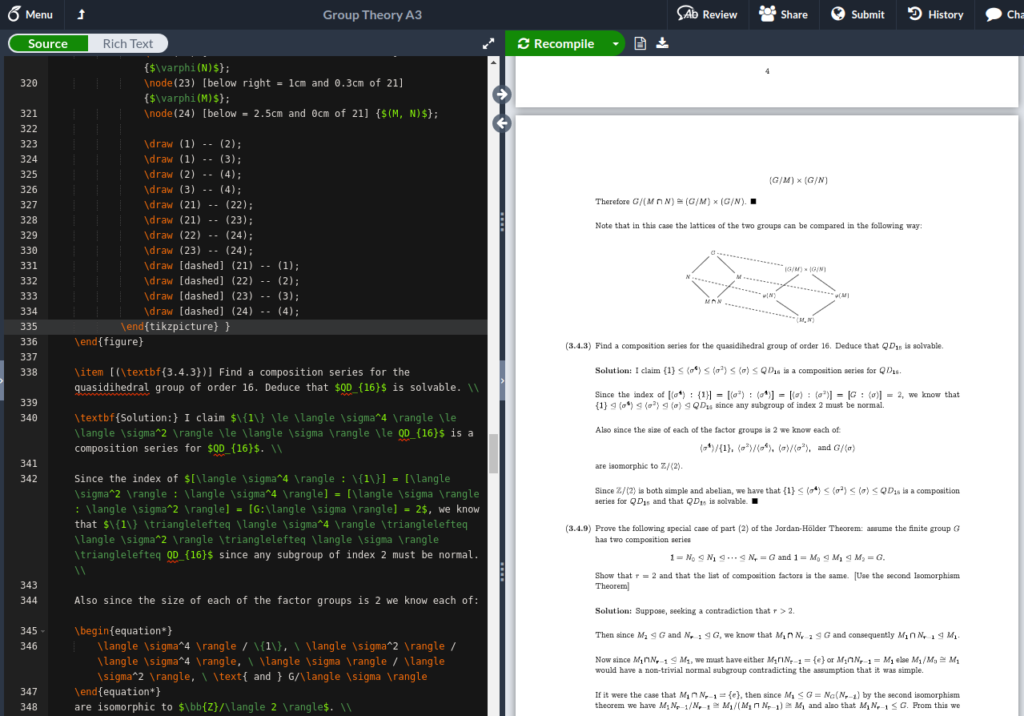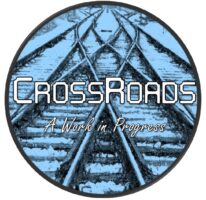These days we have many choices of software that we can use to make writing easier. One piece of software you may not have heard of is LaTex; a markup language that can be used to create documents. This means that you write commands in the “LaTex language” (also called the source code) which then can be used to generate a .pdf file that you can share with others. LaTex has gained a lot of popularity in science disciplines and is most often the first choice for writing research papers. Even though LaTex has gained most of its popularity for use in research, there are many reasons you might want to use it in other learning environments, such as an undergrad classroom! Here are a few reasons:

1. Equations and More
For writing math equations and other symbols, LaTex is second to none! Most word processors have an option to search for math symbols to add to your document, but this can be slower, and the specific symbol you are looking for may not be available. In LaTex, you instead write a command in your source code to add the symbol. For example if you wanted to add the mathematical constant Pi to your .pdf, you would type “\pi”. Many symbols have commands that are very intuitive to remember, which can make writing documents that require a lot of math symbols much easier to write for even the novice LaTex user. This makes it an excellent tool to use for typing up assessments in science classes! Educators who have their students type up their assessments in LaTex, would have more options for giving feedback to their students, such as adding comments to their students code, annotations, or even screencasts! Learners may find that using LaTex can make editing their documents much easier as well (especially if the alternative is writing the assessment in pen or pencil!)
2. Open Source; A Variety of Options
One of LaTex’s greatest advantages is that it is open source; meaning that it is free for the public to use and improve! One implication of this is that there is a large and ever growing variety of LaTex editors available for use. Some can be installed locally on your computer like TeXmaker and others can store your files in the cloud (online) like Overleaf. In addition to this, many people develop free libraries / packages for public use that add additional functionality to LaTex (such as creating diagrams, tables, fonts, etc… ). LaTex has been around for quite a while, so this guarantees that there is a package for almost any need! In particular, many of the diagrams you might need to add for a chemistry or math assignment might be easily done with the right package.
3. Shareability and Collaboration
Online editors like Overleaf make it easier than ever to not only share your work, but also collaborate with others. Overleaf functions similarly to google docs in the sense that it stores your LaTex files online and allows you to add others as collaborators to certain files so you may work on them together. This has a lot of potential to be used for giving feedback in the classroom. Using Overleaf, students could more easily practice peer feedback by simply adding a reviewer as a collaborator to the document, and having them leave comments!
4. It’s Not A Word Processor!
LaTex is in fact not a word processor! It is a document preparation system, meaning it uses source code typed by the user to generate a document in contrast to the “What you see is what you get” style of most word processors. This may seem like an unnecessary level of added difficulty, but it has many advantages. One is that it allows you to focus purely on the content of your writing first, and worry about formatting later. For assignments in most undergraduate science classes, it is often the case that the professor may care more about the content of your assignment rather than the way it is formatted. So you may find the way LaTex is structured to be advantageous in this scenario.
5. An Active And Helpful Community
Last, but certainly not least, LaTex has a large amount of users that are active online and happy to help with any problems you run into! Odds are that if you run into a problem, or want to create a very specific diagram or table for example, someone has solved the problem already and posted a solution online! Sites like Stack Exchange have question and answer based forums for exactly this, and have many active users.
The benefits and possibilities that come with using LaTex that I listed above are just scratching the surface! If you’re sold on using LaTex, check out these other helpful (free!) resources below (some of which I mentioned):
- LaTex Tutorial
- List of Common Symbols
- Overleaf – A free online LaTex editor
